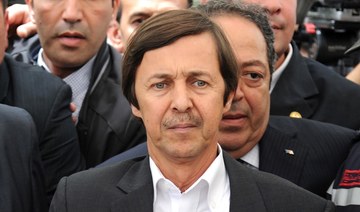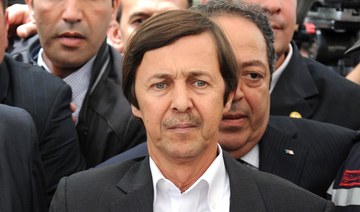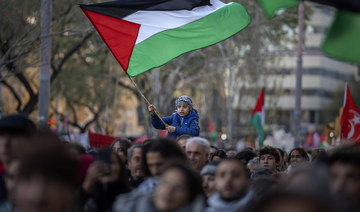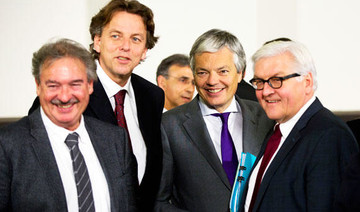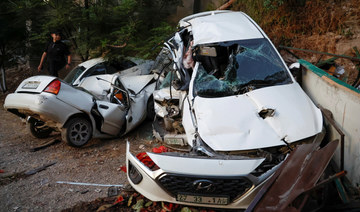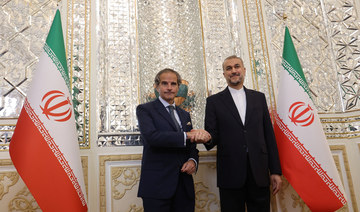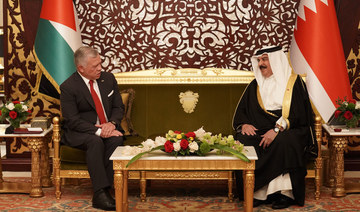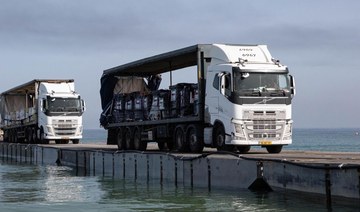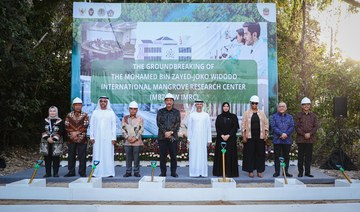ALGIERS: On Feb. 22, 2019, sudden and unprecedented protests swept Algeria. A year on, despite bringing down a president, the “Hirak” protest movement faces mounting challenges.
Massive anti-government protests held every Friday quickly gathered momentum: Six weeks in, President Abdelaziz Bouteflika resigned after 20 years in power.
But Algeria’s military was quick to reassert control and by the time presidential elections were held in December, a former Bouteflika ally succeeded him in a vote deeply opposed by protesters and shunned by most voters.
“With the presidential election, we passed into act two, with all the specter of improbability, uncertainty and instability” that entails, Karima Direche, an historian of contemporary North Africa, told AFP.
“It matches what Algerians have been saying for a year: ‘Everything is moving and nothing is changing.’” While a year of weekly protests has not yet brought down “the system” that they challenged, the Hirak movement has profoundly changed Algeria’s political landscape.
Bouteflika’s resignation and the imprisonment of corrupt businessmen and politicians are “tangible results, even if the main demand of regime change and systemic reform is far from having been achieved,” said Dalia Ghanem, a researcher with the Carnegie Middle East Center in Beirut.
But Hirak’s biggest success, she said, was “the increased awareness of Algerians and their desire to reconnect with politics ... without fear of another civil war.”
A brutal war between the Algerian army and Islamist rebels killed some 200,000 people in the 1990s.
The trauma of the conflict was exploited under Bouteflika to discourage dissent, and until February 22 had rendered large protests on the streets unimaginable.
Ahead of the first protests, Algeria’s political system had remained focused on presidential polls that were widely expected to return Bouteflika to power — despite the 82-year-old being largely incapacitated since a stroke in 2013.
Cut off from the public, the regime sensed growing anger but underestimated it. Young Algerians — disproportionately affected by massive unemployment in a country where the majority is under 30 — were fed up with being represented by a wheelchair-bound octogenarian whose rare public appearances elicited mockery online.
Simmering anger peaked when, during a meeting of the president’s party, a portrait of Bouteflika was addressed by party apparatchiks in the absence of the ailing leader.
Calls to protest on Feb. 22 began multiplying across social media.
Few expected the movement to take hold though, especially in Algiers, where since 2001 public rallies had been banned.
But then on the first Friday, overwhelmed police stood aside as tens of thousands of peaceful demonstrators poured out onto the streets.
In a country without a real opposition party or union, for the first time “the street appeared as a protest force,” said Karima Direche, an historian at the French National Center for Scientific Research.
According to Jean-Pierre Filiu, professor of Middle East studies at Sciences Po University in Paris, the Hirak has for the past year taken center stage in “both the nation’s history and public space.”
And by keeping the protests peaceful, “the movement has changed the rules of the game in Algerian politics, which was previously marked by violence and a lack of transparency.”
The Hirak has also shown the profound transformation of Algerian society: Led by an educated and hyperconnected youth, and in particular women, who are now determined to be heard.
Algeria’s new president, Abdelmadjid Tebboune, aged 74, “will have to deal with that. He won’t be able to rule like those before him,” said Direche.
A year on, the protests are smaller than in spring 2019, but the movement remains strong.
The Hirak wants to influence the changes promised by the new president but is struggling to structure itself and agree on a future strategy.
“As the movement celebrates its first anniversary, I want to ask ‘What’s next?,’” said Ghanem. “What do you want? What are you demanding and how will you obtain concrete results?”
Several civil society groups born of the Hirak movement are to hold a conference in Algiers on Sunday marking the anniversary in a bid to unify their ranks as a political force.
Participants from across Algeria and abroad will examine a “Feb. 22 Proclamation” summing up the demands and slogans of the protest movement, organizers said.
A year on, challenges remain for Algerian protest movement
https://arab.news/98gkv
A year on, challenges remain for Algerian protest movement
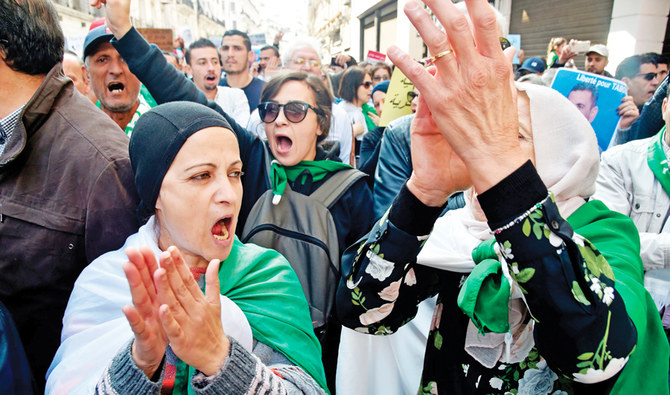
- A year on, the protests are smaller than in spring 2019, but the movement remains strong
Joy in Palestinian refugee camp in Beirut as European trio advances cause
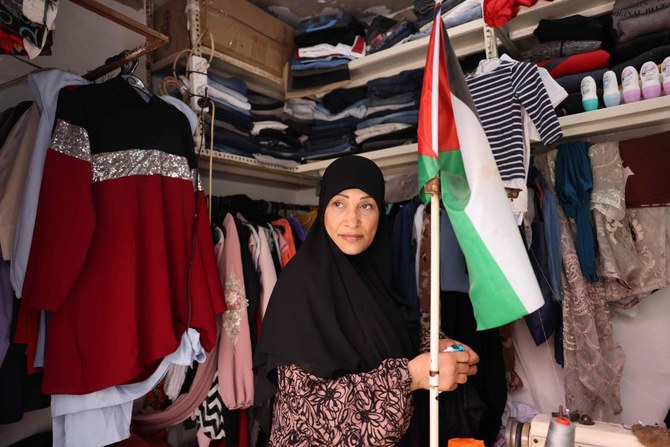
- “We hope that the whole world will recognize Palestine, and we are happy with this decision... It is a beautiful feeling,” said Alaa Ghozlan
- Israel was enraged by the move announced Wednesday by Ireland, Norway and Spain, arguing that it amounts to “rewarding terrorism”
SHATILA, Lebanon: In Beirut’s impoverished Palestinian refugee camp of Shatila — a maze of alleyways where posters honor fallen martyrs — residents expressed joy Wednesday after three European countries said they would recognize a Palestinian state.
“We hope that the whole world will recognize Palestine, and we are happy with this decision... It is a beautiful feeling,” said Alaa Ghozlan, 26, whose family is originally from Haifa, now in northern Israel.
“We now have hope to return to our country — a country I was not born in and was deprived of but which lives inside me despite everything,” he told AFP on a winding street in the camp.
Israel was enraged by the move announced Wednesday by Ireland, Norway and Spain, arguing that it amounts to “rewarding terrorism” after Palestinian militant group Hamas launched its unprecedented October 7 attack on Israel that sparked the bloodiest ever Gaza war.
Seven other European countries including Sweden have already recognized Palestinian statehood.
Lebanon hosts an estimated 250,000 Palestinian refugees, many living in poverty in the country’s 12 official camps, according to the United Nations agency for Palestinian refugees (UNRWA).
Most are descendants of survivors of what Palestinians call the Nakba — the “catastrophe” — when about 760,000 Palestinians fled or were forced from their homes by the 1948 war over Israel’s creation.
Shatila resident Samah Omari, 50, a housewife, said she was “very happy” with the decision, and expressed hope that it would eventually impact her and her family.
“People are dying in Palestine. We demand our rights and defend our land so that our state can be recognized by all countries,” she said.
“We hope to return to our country and not be refugees anymore,” she added.
The camp’s tumbledown walls are adorned with Palestinian flags and posters in support of militant groups including Hamas and their leaders.
Men on motorbikes and tuk-tuks squeeze past women shopping and schoolchildren making their way through the streets.
Above, matted electricity wires and plastic water tubes are bound precariously with rope or cables, some weighed down by clothes that have fallen from washing lines.
The United States and most Western European nations have said they are willing to one day recognize Palestinian statehood, but not before agreement is reached on thorny issues like final borders and the status of Jerusalem.
But Israel’s war against Hamas militants in Gaza, with its mounting death toll, has given the issue new impetus.
Suliman Abdel Hadi, 70, an official at the camp, said the timing of the decision was “important after October 7 because of the massacres carried out by the brutal Zionist enemy.”
“We see a bright future for the Palestinian cause,” said Abdel Hadi, whose family is from the Acre area, now in northern Israel.
“What happened today is the result of sacrifices made by the Palestinian people over 76 years of persecution, killing and destruction,” he added.
Hamas’s October 7 attack resulted in the deaths of more than 1,170 people, mostly civilians, according to an AFP tally of Israeli official figures.
Militants also took 252 hostages, 124 of whom remain in Gaza, including 37 the army says are dead.
Israel’s retaliatory offensive has killed at least 35,709 people in Gaza, most of them civilians, according to the Hamas-run territory’s health ministry.
On another street in Shatila, a man who gave his name as Abu Majdi, and whose father originally hailed from Haifa, called the decision “great” and said it was “baptised in the blood of martyrs.”
“This recognition will change the future of coming generations and the future of the Palestinian cause,” said the 63-year-old man, a Palestine pendant hanging from his neck.
Israel allows return to three evacuated West Bank settlements
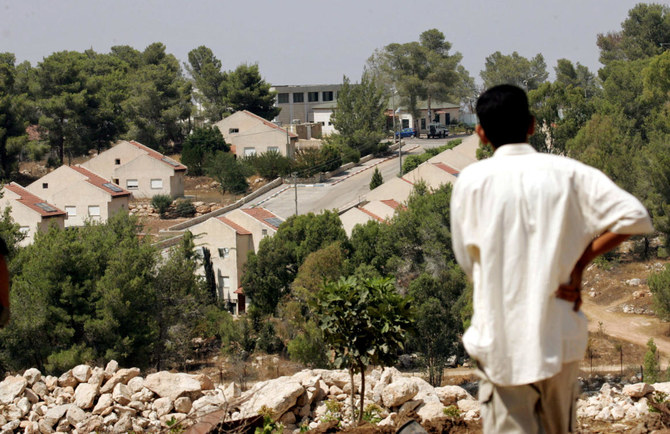
- The military announced the move on the day three European states said they would formally recognize the State of Palestine
- A fourth settlement, Homesh, was cleared for entry last year
JERUSALEM: The Israeli military has approved permission for Israelis to return to three former West Bank settlements they had been banned from entering since an evacuation ordered in 2005, the defense ministry said on Wednesday.
The three settlements, Sa-nur, Ganim and Kadim, are located near the Palestinian cities of Jenin and Nablus, both of which are strongholds of armed militant groups in the northern West Bank.
A fourth settlement, Homesh, was cleared for entry last year after parliament passed an amendment to the so-called “disengagement law” of 2005. Permission from the military, which has overall control of the West Bank, was required for any return to the other three former settlements.
The military announced the move on the day three European states said they would formally recognize the State of Palestine, and as Israel’s military offensive against the Palestinian militant group Hamas continued in the Gaza Strip.
It took the decision despite international pressure on Israel to curb settlement expansion in the West Bank, which Palestinians want as the core of a future independent state alongside Gaza.
“The Jewish hold on Judea and Samaria guarantees security, the application of the law to cancel disengagement will lead to the development of settlement and provide security to residents of the area,” Defense Minister Yoav Gallant said in a statement, using the Biblical names for the West Bank that are often used in Israel.
There was no immediate comment from the Palestinian Authority.
Last year’s amendment to the disengagement law was seen as opening the way to re-establishing former West Bank settlements evacuated in 2005 under a plan overseen by former Prime Minister Ariel Sharon.
Under the plan, which was opposed by the settler movement at the time, all 21 Israeli settlements in Gaza were ordered to be evacuated. Most settlements in the West Bank were unaffected apart from the four that will now be accessible again.
More than 500,000 Jewish settlers are now estimated to be living in the West Bank, part of territory captured by Israel in the 1967 Middle East war, with a further 200,000 living in East Jerusalem.
For Palestinians and most of the international community, the settlements are considered illegal. Israel disputes this, citing the Jewish people’s historical, biblical and political links to the area as well as security considerations.
Despite international opposition, settlements have continued to expand strongly under successive Israeli governments.
Death of Iran’s president has delayed talks with UN nuclear watchdog, Grossi says
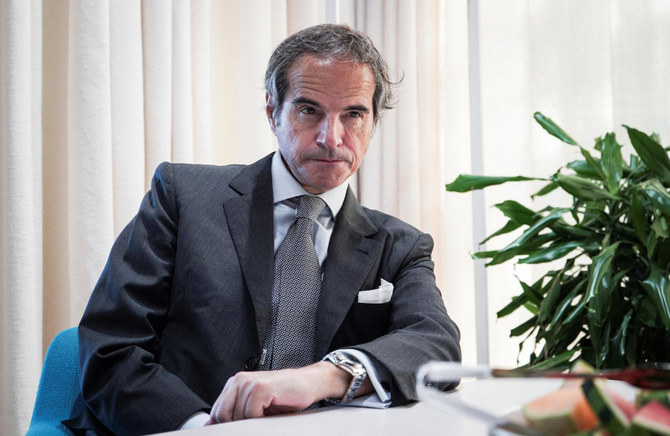
- The International Atomic Energy Agency faces a range of challenges in Iran
- Nuclear watchdog has been trying to expand its oversight of Iran’s atomic activities
HELSINKI: The deaths of Iran’s president and foreign minister in a helicopter crash have caused a pause in the UN nuclear watchdog’s talks with Tehran over improving cooperation with the agency, the watchdog’s chief Rafael Grossi told Reuters on Wednesday.
“They are in a mourning period which I need to respect,” International Atomic Energy Agency (IAEA) chief Grossi said in Helsinki, where he spoke at a nuclear conference.
“But once this is over, we are going to be engaging again,” he said, describing it as a “temporary interruption that I hope will be over in a matter of days.”
Grossi said the IAEA was planning to continue technical discussions with Iran but they had not yet taken place due to last weekend’s helicopter crash that killed President Ebrahim Raisi and Foreign Minister Hossein Amirabdollahian.
The IAEA faces a range of challenges in Iran, from Tehran’s recent barring of many of the most experienced uranium-enrichment experts on its inspection team to Iran’s continued failure to explain uranium traces found at undeclared sites despite a years-long IAEA investigation.
The IAEA has been trying to expand its oversight of Iran’s atomic activities while the country’s uranium-enrichment program continues to advance. Iran is enriching uranium to up to 60 percent purity, close to the 90 percent of weapons-grade, which no other country has done without developing nuclear weapons.
Tehran says its aims are entirely peaceful.
Iran currently has about 140 kg of uranium enriched to up to 60 percent, Grossi said. According to an IAEA definition, that is theoretically enough, if enriched further, for three nuclear bombs. The IAEA’s last quarterly report in February said Iran had 121.5 kg, enough for two bombs.
Iran is still producing about nine kg a month of uranium enriched to up to 60 percent, Grossi said. It is also enriching to lower levels at which it has enough material for potentially more bombs.
Grossi, who two weeks ago said he wanted to start to see concrete results on improved cooperation from Iran soon, repeated that hope but said a more wide-ranging deal would require “a bit more time.”
For now, his team had not made progress on the main issues, he said.
“It is high time there is some concrete issuance and if not resolution, some clarification of what is this,” Grossi said of the uranium traces at undeclared sites.
“And I would say, confidence in many parts of the world (in Iran on the nuclear issue) is growing thinner.
Bahrain’s king to visit Russia and China
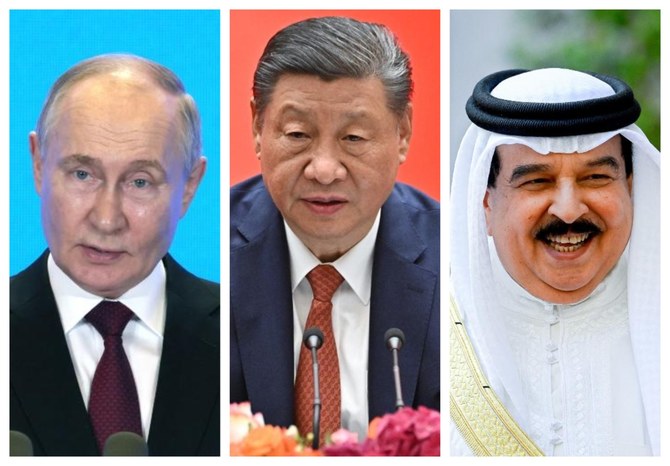
DUBAI: Bahrain’s King Hamad bin Isa Al-Khalifa is visiting the Russian capital, Moscow, on Wednesday at the invitation of President Vladimir Putin, state news agency BNA reported on Wednesday.
The two leaders will discuss cooperation between their respective countries, regional and international developments, and the results of the 33rd Arab Summit, hosted last week in Bahrain.
The king will likewise visit China at the invitation of President Xi Jinping to participate in the opening session of the Arab-Chinese Cooperation Forum.
The two will discuss cooperation between Bahrain and China, as well as the outcome of the 33rd Arab Summit.
UAE president to visit South Korea
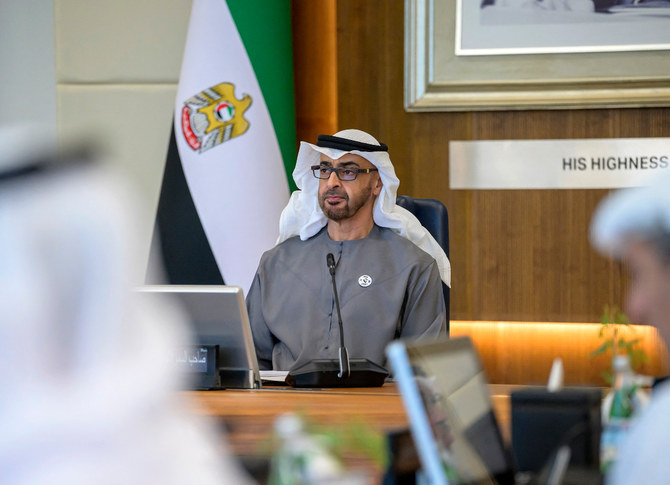
- The two leaders will discuss bilateral ties and explore opportunities for greater collaboration
ABU DHABI: UAE President Mohamed bin Zayed Al-Nahyan will make a two-day state visit to South Korea on May 28 at the invitation of President Yoon Suk Yeol, state news agency WAM reported on Wednesday.
The two leaders will discuss bilateral ties and explore opportunities for greater collaboration across various sectors including trade, investment, energy and technology.
They will also address regional and international developments of common interest.
“The meeting comes within the framework of strategic partnership between the UAE and South Korea in line with their vision to achieve a better and more prosperous future for the countries,” the WAM statement said.



